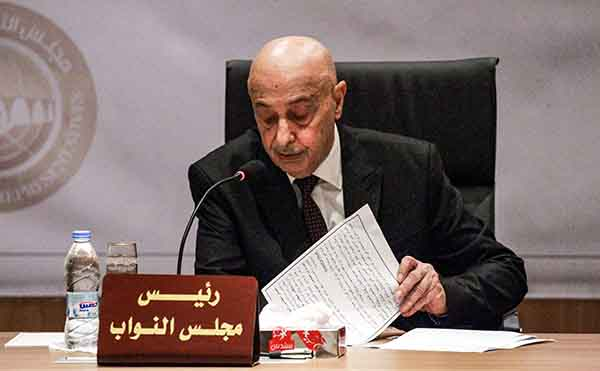
The LNA commander’s move to repair the damage with Saleh aims to thwart any agreement that would lead to the field marshal’s exclusion from the army leadership.
The Commander-in-Chief of the Libyan Army, Field Marshal Khalifa Haftar, surprisingly is praising the role of Parliament Speaker Aguila Saleh, who is eager to find to a way out of a dilemma that may end his political role.
Haftar’s move reflects an attempt to get closer to Saleh after months of silent disagreement between the two men that had an impact in the eastern region.
On Sunday, Haftar praised, during his meeting with the army officers at the headquarters of the General Command in Rajma, eastern Libya, the role of Speaker Aguila Saleh.
Haftar called Saleh a “patriotic figure par excellence,” indicating that “he was the true supporter of the armed forces throughout his tenure as Speaker of Parliament.”
The official page of the Libyan Armed Forces (LNA) on social media stated that Haftar concluded his speech by pointing out that Saleh comes from a tribe known for its bravery and resistance to the colonisers and which had offered martyrs and sacrifices for the sake of Libya.
It is not clear what prompted the Libyan National Army commander to heap his praise on Aguila Saleh. Some analysts have linked it to the dilemma that Aguila Saleh faces. But it was recently rumoured that the Islamists in Libya are planning to remove him from the presidency of the Parliament after they refused during the talks in Tunisia to accept him as the president of the new presidential council.
Reports are circulating about a strongly UN-backed agreement that would instal Aguila Saleh as president of the Presidential Council and current Minister of Interior in the Government of National Accord, Fathi Bashagha, as prime minister. This has prompted Saleh in recent days to put some distance between him and Haftar, causing along the way the emergence of disputes in the eastern region.
Activists close to the LNA launched a campaign against Saleh, accusing him of treason and of placing his personal interest before the “national cause.” In response, activists from the tribes of the eastern region counter-attacked with a campaign against Haftar and his sons, accusing them of corruption and of squandering public money at a time when most Libyans are living in difficult economic conditions.
Haftar’s move to repair the damage with Saleh aims to thwart any agreement that would lead to the field marshal’s exclusion from the army leadership, or at least clipping his wings and ending his absolute control over the eastern region.
Haftar’s initiative deepens Saleh’s confusion, who had sensed the seriousness of the dangers surrounding him. He moved to use his powers to prevent the convening of the parliament session in the city of Ghadames, which Islamists and those close to them hinted will be a session to re-elect a new parliament speaker. On the executive side, it is still unclear how things will pan out regarding the restructuring of the executive authority, especially amid persistent rumours about maintaining Fayez al-Sarraj as president of the Presidency Council and appointing a prime minister from the eastern region.
At a time when a group of members of parliament is preparing to hold a meeting in the city of Ghadames on Monday, Aguila Saleh issued a call for another meeting in the eastern city of Benghazi. Saleh’s supporters accused those behind the Ghadames meeting of “seeking to choose a parliament speakers loyal to the Muslim Brotherhood.”
Saleh’s supporters have questioned the constitutionality of the decision of the members participating in the Tangiers dialogue to hold a meeting in Ghadames. They argued that only the current parliament Speaker, Aguila Saleh, and the parliament council have the power to invite parliamentarians to convene.
Observers believe that Saleh’s call for a parliament session in the city of Benghazi, the official and constitutional headquarters of the parliament, aimed to legally block any attempts to transfer the meeting to Ghadames, and thus prevent the process of electing a new speaker.
It is not known whether or not Saleh will react positively to Haftar’s initiative, especially after he had received a call from the acting head of the UN mission in Libya, Stephanie Williams, following his call for the meeting in Benghazi, which many considered a message of support for Saleh and perhaps an attempt to reassure him about her continued support for the proposal to nominate him as President of the Presidential Council.
The rift between Haftar and Saleh began last May, after the Speaker of the Parliament announced an initiative for a political settlement, which sent messages at the time to the effect that Saleh opposed the army’s intransigence to continue fighting south of Tripoli and accepted the international proposal, which stipulated the need for the army to withdraw from all of its positions before embarking on the political path.
At that time, Haftar tried to block the road to Saleh by seeking a mandate from the tribes to proceed with taking over the government and ending the Skhirat Agreement. But despite the tribes’ response to his request, he was forced later to calm things down and backtracked on the idea of freezing the current parliament which derives its legitimacy from that agreement.
Since then, a kind of siege has been imposed on Haftar, whether locally or internationally, as the major tribes in the eastern region (Al-Awaqir, Al-Maghariba, and Al-Abidat) have toned down their support for him, while most countries seemed to stop communicating with him, amid incessant talk about an end to his role, especially following signals from Egypt in support of curbing his influence on the scene in Libya.
